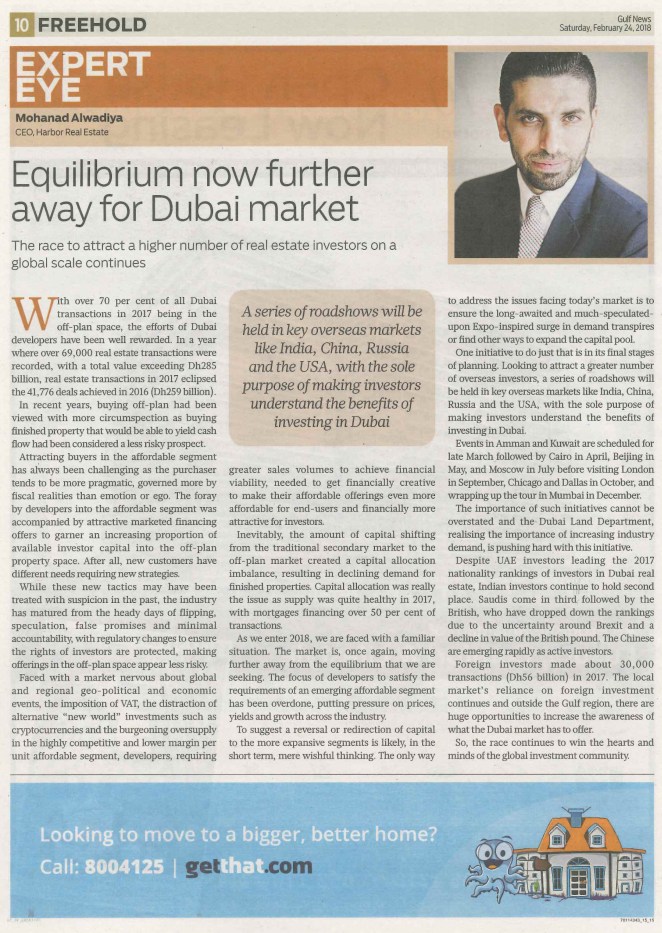قال مهند الوادية المحاضر في معهد دبي العقاري التابع لدائرة الأراضي والأملاك بدبي ومقدم برنامج معمار بنسختيه التلفزيونية والإذاعية، ان قطاع العقارات في دبي اثبت جدارته وسط ارتفاع حدة المنافسة العالمية على استقطاب رؤوس الأموال. إذ لا يزال السوق يتصدر قائمة اهم الوجهات الاستثمارية العالمية. وأوضح الوادية أن هناك 10 عوامل من وجهة نظره ستؤثر على أداء قطاعات العقارات المحلية والعالمية وقدرتها على جذب المشترين من فئة المشتريين النهائيين أو المستثمرين وهي :
1 أسعار النفط
إن سعر النفط لا يزال يؤثر على مستويات السيولة، وعلى القوة الشرائية وأداء اقتصادات الدول التي يعتمد اقتصادها على عوائد النفط وأيضا على ثقة المستثمرين بشكل عام. ولذلك ليس هناك شك في أن الحفاظ على أسعار النفط عند أو فوق 50 $ / برميل خلال عام 2017 سيساعد ايجابيا على أداء قطاع العقارات لاسيما وأن اقتصاد دبي غادر منذ زمن الاعتماد الكامل على النفط في نموه متوجها إلى التنويع.
2 أسعار العملات
تبلغ نسبة المستثمرين في عقارات دبي ممن يتعاملون بعملات غير مرتبطة بالدولار الأميركي بين 40٪ و 50٪ ولذلك تبرز قوة الدولار كتحدي. ولعل اقرب مثال كان في انخفاض قيمة الروبل الروسي الذي أدى إلى تراجع الاستثمارات الروسية في سوق العقارات في دبي والتي عوضها إلى حد بعيد المستثمر الصيني.
3 الاستقرار السياسي
تتمتع الأسواق العقارية التي تقع في بلدان آمنة بنمو مستقر وذلك يظهر جليا في دولة الإمارات العربية المتحدة، في حين يتزايد قلق المستثمرين في اغلب الأسواق العقارية العالمية بسبب تأثرها بالتقلبات السياسية والنزاعات التي تضرب العديد من المناطق في العالم.
4 العرض والطلب
بلغ سوق عقارات دبي نضجاً واضحاً على صعيد التحرك وفقا للعرض والطلب ويتوقع أن يشهد 2017 توازناً بين العرض والطلب لاسيما مع مضي العديد من شركات التطوير العقاري بالتوجه لتلبية ذوي الدخل المتوسط وهي الشريحة التي تمثل أكبر فئة في قائمة الطلب على العقارات في الوقت الراهن.
5 التشريعات
أثبتت دبي بتطويرها المستمر للبنية التشريعية مقدرتها على حماية حقوق أطراف التعاقد عموما والمستثمرين خصوصا ويتوقع أن تواصل السلطات التشريعية تطوير الإطار القانوني في عام 2017 الأمر الذي يرفع مستويات الثقة بالسوق لاسيما سوق الإيجارات.
6 الرهن العقاري
يتوقع أن يساهم الرهن العقاري في زيادة نمو القطاع فقد كانت حصة صفقات الشراء الممولة بالقروض 30٪ -35٪ من اجمالي المبيعات لكنها زادت إلى 45٪ و50% تقريبا خلال 2016 وهذا يعكس ارتفاع ثقة المؤسسات والبنوك في قطاع العقارات ونجاح الأطراف في التكيف مع الآليات التي ظهرت في 2014 لتنظيم الرهن العقاري.
7 ثقة المستثمرين
تراجعت مستويات ثقة المستثمرين على مستوى العالم على خلفية التقلبات الاقتصادية والسياسية العالمية في السنوات القليلة الماضية. مستويات عدم اليقين المحيطة بالسياسات الاقتصادية والاضطرابات الجيوسياسية والتوتر الاجتماعي في العديد من البلدان في جميع أنحاء العالم افرزت جواً من التردد ومع ذلك، تمكن قطاع العقارات في دبي من المضي قدما بإجراءات تعزز ثقة المستمرين.
8أداء القطاعات الاستثمارية
عائدات الاستثمار في عقارات دبي لا تتوقف عند 7 وحتى 9 % سنويا في سوق الإيجارات بل يتجاوزه إلى زيادة القيمة الرأسمالية للعقار ما بين 5-7% سنويا في سوق البيع وتحديدا عقارات ذوي الدخل المتوسط والواقعة في مناطق دبي الجديدة واذا ما اضفنا إلى تلك العائدات ميزة حرية انتقال الأموال تصبح ثقة المستثمر بعقارات دبي محصلة طبيعية بينما يواجه المستثمرون في العديد من الدول قيوداً على ذلك الصعيد وكان آخرها الصين.
9 الإنفاق الحكومي
تواصل دبي الإنفاق على مشاريع البينة التحتية على نحو مستمر في إطار التزامها بدعم التنمية الاقتصادية وهذا يقود إلى اتساع رقعة عمليات التطوير الحضري من جانب شركات التطوير العقاري لاسيما – في المستقبل القريب- التي تلبي متطلبات استضافة اكسبو العالمي 2020 والذي بدوره سيدعم الاقتصاد ليسجل نمواً ما بين 4 – 3.5٪.
10 التسجيل العقاري
رسوم شراء وسرعة تسجيل العقارات في دبي تعد تنافسية على الصعيد العالمي، وأكدت أراضي دبي أنها لا تعتزم زيادتها ، ومن المتوقع أن تستمر وتيرة عروض القيمة المضافة كخطط الدفع الميسرة من قبل المطورين وعروض البيع التي تتضمن رسوم التسجيل المدفوعة من قبل المطورين مما سيزيد من جاذبية قطاع العقارات في دبي للمشتريين النهائيين والمستثمرين.










